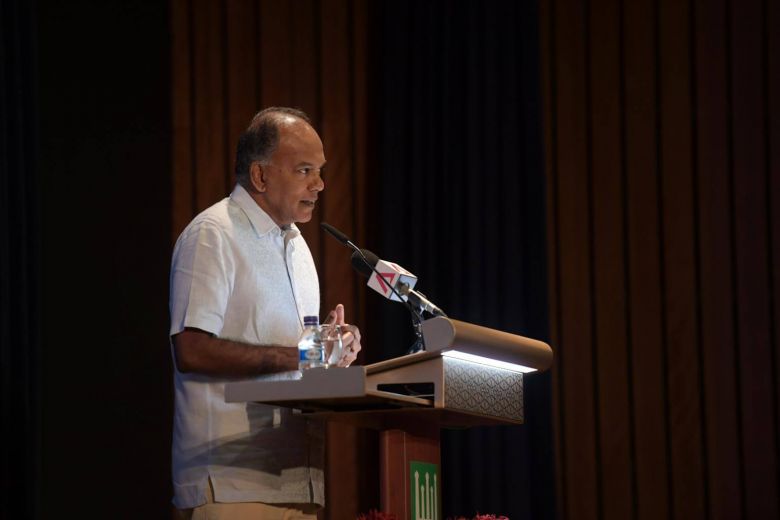SINGAPORE – Extremism and divisive practices are problems that are not the sole preserve of any one religion, despite what terrorist groups and their actions might seem to suggest.
Home Affairs and Law Minister K. Shanmugam stressed this on Friday (Oct 13), pointing out that it is the goal of terrorist groups such as ISIS, to try and sow “deep divisions” and Islamophobia within society.
“We have to get away from the idea of linking any particular religion with extremism,” said Mr Shanmugam. He was speaking at the opening of a two-day international conference on the role of Muslim non-governmental organisations (NGOs) in promoting peace.

Home Affairs and Law Minister K. Shanmugam pointed out that it is the goal of terrorist groups such as ISIS, to try and sow “deep divisions” and Islamophobia within society.PHOTO: FILE
He cited deep-seated conflicts in the region – between Catholics and Muslims in the Philippines, and Buddhists and Muslims in Myanmar – to illustrate the point that extremists on all sides abuse religion for their nefarious ends.
He also noted that the “high-profile nature of the attacks in the last few years, linked with terrorists who do it in the name of Islam, has created this mindset amongst a lot of people of associating Islam with terrorism”.
Governments in Asia, Europe and elsewhere must take an active part in dispelling this misconception, at a time when terrorists want to divide Muslims and non-Muslims, he said.
It is also important for NGOs, community leaders and religious leaders to come together, he added, saying conferences like this week’s can allow the discussion of “thorny, sensitive issues” that might arise from living in multi-religious societies.
These include scholars who say Muslims cannot extend Christmas or Deepavali greetings, and the case of a laundrette in Malaysia that said only Muslims could use it and which rulers have said is not acceptable. It would do Muslims and non-Muslims a great service if these issues are considered at such forums, the minister said, adding a stamp of authority would make sure the ground does not get confused.
“My understanding is that from the very early years, Muslims co-existed peacefully with others in Mecca and many other places,” said Mr Shanmugam.
“Sometimes, the majority are Muslims and sometimes they are the minority. They all co-existed peacefully and integrated in a way that contributed to society.”
In his 30-minute speech, Mr Shanmugam outlined Singapore’s efforts to maintain harmony between people of different faiths, citing how the police take a firm stand against those who insult religious feelings as well as how ethnic quotas in public housing estates ensure that racial enclaves do not develop.
He noted that Singapore took a firm stance on those who offend religious sensitivities, saying: “If you suggest some statement that Muslims are terrorists, or Christians are like this, or Jews are like this, my internal security people will come and talk to you straightaway.”
The two-day forum which started on Friday, was organised by Jamiyah Singapore and the Morocco-based Islamic, Educational, Scientific, and Cultural Organization (Isesco).
Speaking before the minister, Dr Mohammad Abdul Karim Al-Issa, secretary-general of the Muslim World League, pointed out that according to surveys done by his NGO, only 1 per cent of Muslims worldwide can be considered extremists, adding that this was often due to a lack of understanding of Islam.
Mr Shanmugam said this figure was “nothing” compared with the population of Muslims around the world.
“Most people are tolerant, most people believe in accommodation, but a small minority today hold the rest of us hostage,” he said.
Jamiyah president Mohd Hasbi Abu Bakar said it is “religiously incumbent” on Muslims to tell others that to “resort to violence in the pursuance of one’s goals, is to cross the ‘red line’ of Islam”.
Mr Mustafa Rasheed, council member of the Muslim Youth Ambassadors for Peace – a Jamiyah initiative to get volunteers to steer their peers away from extremism – said he does just that, by organising dialogues with different religious communities.
More Muslims have to follow suit, engage other communities and dispel misconceptions about Muslims, said Mr Mustafa, 33.
“(We need to) say, ‘I’m a human being just like you’. I like the same things, I also get hungry, I also like to have fun,” he said.








































admin in: How the Muslim Brotherhood betrayed Saudi Arabia?
Great article with insight ...
https://www.viagrapascherfr.com/achat-sildenafil-pfizer-tarif/ in: Cross-region cooperation between anti-terrorism agencies needed
Hello there, just became aware of your blog through Google, and found ...